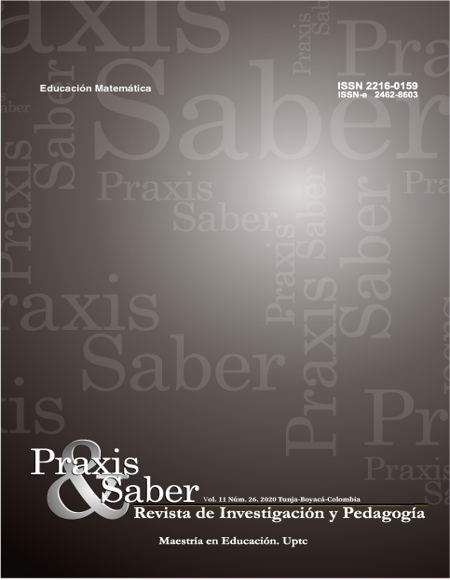Resilience in successful math students

Abstract
The research objective was to assess the relation between academic performance in mathematics and school success in higher education students. The research adopted a quantitative, descriptive-comparative and microsociological approach. Data came from primary sources. Data collection was transectional and the sample consisted of 1500 students. The Wagnild and Young’s resilience scale was used. The results show that there is a strong relation among the exigency level, the application of mathematics, abstraction, and academic performance. Students develop emotional resilience skills that allow them to improve their quality of life. In conclusion, resilience is significantly related to all personality strengths, as well as to positive change acceptance and personal competence.
It was identified that, while resilience helps students become more tolerant and better understand what is happening in their environment, it is precisely in these challenges where the strengths brought by high educational performance are manifested. Successful students display formal thinking skills, creative thinking, application of mathematics, and resilience, all of which influence their quality of life.
Keywords
mathematic, school success, academic performance, resilience, quality of life
References
Castanyer, O. (2010). Assertiveness: expression of a healthy self-esteem (31st edition). Bilbao: Desclée de Brower.
Castro, A. (2010). Concepciones teóricas acerca de la Psicología Positiva. En A. Castro (Comp.), Fundamentos de Psicología Positiva (pp. 17-41). Buenos Aires: Paidós.
Celis, J., Bustamante, M., Cabrera, D., Cabrera, M., Alarcón, W., & Monge, E. (2001). Ansiedad y estrés académico en estudiantes de medicina humana del primer y sexto año. Anales de la Facultad de Medicina, 62(01), 25-30.
Covington, M. (2000). Goal Theory, Motivation, and School Achievement: An Integrative Review. Annual Review of Psychology, 51, 171-200. https://doi.org/10.1146/annurev.psych.51.1.171
Crombie, P., López, M., Mesa, M., & Samper, L. (2015). Adaptación de la Escala de Resiliencia
de Wagnild y Young. Bogotá: Universidad de Los Andes.
Cruz, M. (2016). Factores que influyen en el rendimiento académico del estudiante. Escenarios: empresa y territorio. 5(5), 93-128.
Duek, C. (2010). Childhood, development and knowledge: children and their socialization. Latin American Journal of Social Sciences, Children and Youth, 8, 799-808.
Gallardo, H., Vergel, M., & Villamizar, F. (2018). Investigación intervención y enfoque multimétodo en ciencias humanas y educación matemática. Logos Ciencia y Tecnología, 9(2), 84-96. https://doi.org/10.22335/rlct.v9i2.458
García, F. (2008). Motivate for learning from the orienting activity. Madrid: CIDE.
García, L. (2003). La psicología positiva: del modelo de la reparación al modelo del fortalecimiento. Revista Hojas Informativas de los Psicólogos de las Palmas, 56, 1-5.
Grotberg, E. (2006). ¿Qué entendemos por resiliencia? ¿Cómo promoverla? ¿Cómo utilizarla?. En E. Grotberg (Comp.), La resiliencia en el mundo de hoy. Como superar las adversidades (pp. 17-57). España: Gedisa, S. A.
Hallinger, P., & Heck, R. (2014). Collaborative leadership and school improvement: Understanding the impact on school capacity and student learning. REICE. Ibero- American Journal on Quality, Efficacy and Change in Education, 12(4), 71-88. https://doi.org/10.1080/13632431003663214
Jadue, G. (2002). Factores Psicológicos que predisponen al bajo rendimiento, al fracaso y a la deserción escolar. Estudios Pedagógicos, 28, 193-204.
Kotliarenco, M. (1999). Algunas particularidades metodológicas en los estudios sobre Resiliencia. Chile: MAK Consultores.
Kotliarenco, M., Cáceres, I., & Fontecilla, M. (1997). Estado de Arte en Resiliencia. Washington, D.C.: Organización Panamericana de la Salud.
Mata, S., Gómez, M., & Calero M. (2018). Resolución de problemas Interpersonales en Niños en Exclusión Social. Revista Latinoamericana de Psicología, 52(2), 107-116. http://dx.doi.org/10.14349/rlp.2018.v50.n2.4
Mattelart, A. (2003). Interview with Armand Mattelart. Information society and intellectual project. Sign and Thought Magazine, 22(43), 71-77
Moreno, A. (2011). Educación y violencia en la Venezuela actual. Revista de Pedagogía, 32(90), 14-18.
Olivera, J., Braun, M., & Roussos, A. (2011). Instruments for the Evaluation of Empathy in Psychotherapy. Argentine Journal of Clinical Psychology, 20, 121-132.
Osorio, M., Mejía, L., & Navarro, J. (2009). Factores psicosociales que influyen en el éxito o fracaso del aprovechamiento escolar en la asignatura de física básica. Espacios Públicos, 12(26), 261-276.
Pérez, Á. (2012). Ethnography as an integrative method. Colombian Journal of Psychiatry, 41(2), 421-428. https://doi.org/10.1016/S0034-7450(14)60015-9
Rivera, D., Gallardo, H., Mora, A., Gómez, L., & Barrios D. (2018). Rendimiento académico y relaciones intrafamiliares en estudiantes repitentes en secundaria. En S. Carrillo, B. Sanabria, V. Bermúdez, & J. Espinosa, Actores en la Educación: una Mirada desde la Psicología Educativa (pp. 181-208). Barranquilla: Ediciones Universidad Simón Bolívar.
Rodríguez, C., & Valdivieso A. (2008). El éxito escolar de alumnos en condiciones adversas. Revista Latinoamericana de Estudios Educativos, (1-2), 81-106.
Saavedra, E. (2003). El enfoque cognitivo procesal sistémico, como posibilidad de intervenir
educativamente en la formación de sujetos resilientes. Valladolid: Universidad de Valladolid.
Sánchez, D., & Robles, M. (2015). Escala de Resiliencia 14 ítems (RS-14): Propiedades Psicométricas de la Versión en Español. Revista Iberoamericana de Diagnóstico y Evaluación, 40, 103-113.
Sierra, R. (1989). Social research techniques, theory and exercises (8th ed.). España: Paraninfo
S. A.
Wagnild, G., & Young, H. (1993). Development and psychometric evaluation of the resilience scale. Journal of Nursing Measurement, 1(2), 165-178.
Wagnild, G., & Young, H. (2015). ER. Escala de Resiliencia. Barcelona: Draft Grupo Editorial.
Zemelman, H. (2010). Sujeto y subjetividad: la problemática de las alternativas como construcción posible. Polis Revista Latinoamericana, 27, 1-12.
